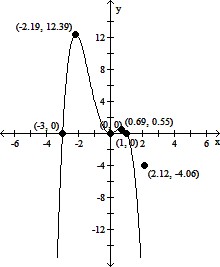Analyze the graph of the given function f as follows:(a) Determine the end behavior: find the power function that the graph of f resembles for large values of |x|.(b) Find the x- and y-intercepts of the graph.(c) Determine whether the graph crosses or touches the x-axis at each x-intercept.(d) Graph f using a graphing utility.(e) Use the graph to determine the local maxima and local minima, if any exist. Round turning points to two decimal places.(f) Use the information obtained in (a) - (e) to draw a complete graph of f by hand. Label all intercepts and turning points.(g) Find the domain of f. Use the graph to find the range of f.(h) Use the graph to determine where f is increasing and where f is decreasing.f(x) = -x2(x - 1)(x + 3)
What will be an ideal response?
(a) For large values of |x|, the graph of f(x) will resemble the graph of y = -x4.
(b) y-intercept: (0, 0), x-intercepts: (-3, 0), (0, 0), and (1, 0)
(c) The graph of f crosses the x-axis at (1, 0) and (-3, 0) and touches the x-axis at (0, 0).
(e) Local maxima at (-2.19, 12.39) and (0.69, 0.55); Local minimum at (0, 0)
(f) 
(g) Domain of f: all real numbers; range of f: (-?, 12.39]
(h) f is increasing on (-?, -2.19) and (0, 0.69); f is decreasing on (-2.19, 0) and (0.69, ?)
You might also like to view...
Multiply the polynomials.(6x - 1)(36x2 + 6x + 1)
A. 36x3 - 1 B. 216x3 - 1 C. 216x3 + 42x2 - 1 D. 216x3 + 1
Simplify the expression. Assume that all variables are positive.
A. y3/4
B. y
C. 
D. y1/2
Write an equation to describe the variation. Use k for the constant of proportionality.s varies directly as b
A. s = kb
B. b = 
C. b = ks
D. s = 
Find the exact function value if it exists.tan 240°
A. -2
B. -1
C. 
D. - 